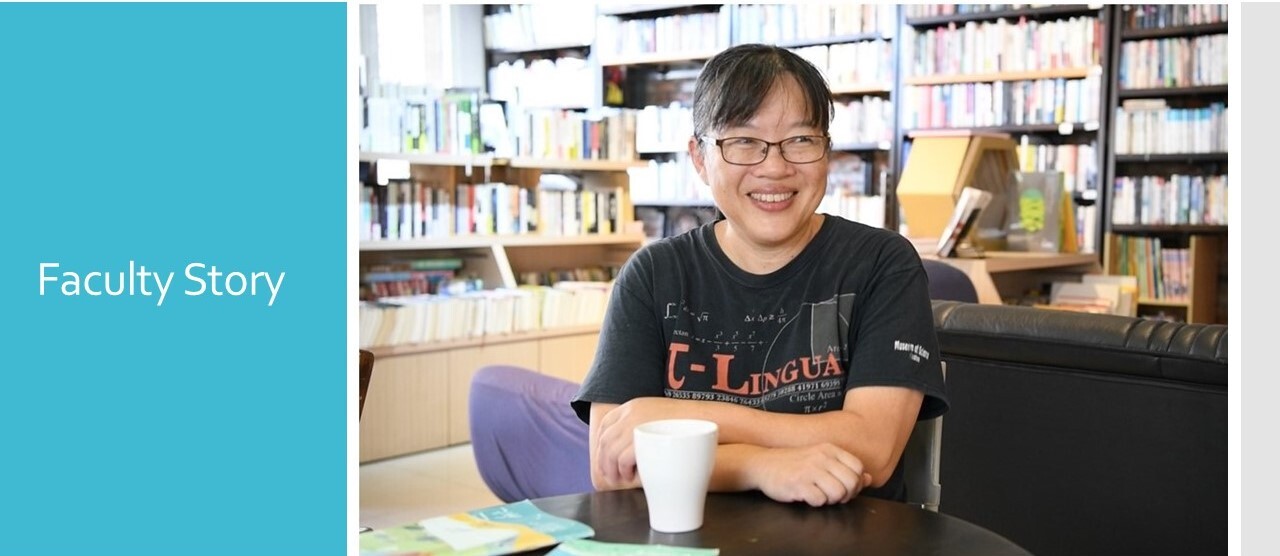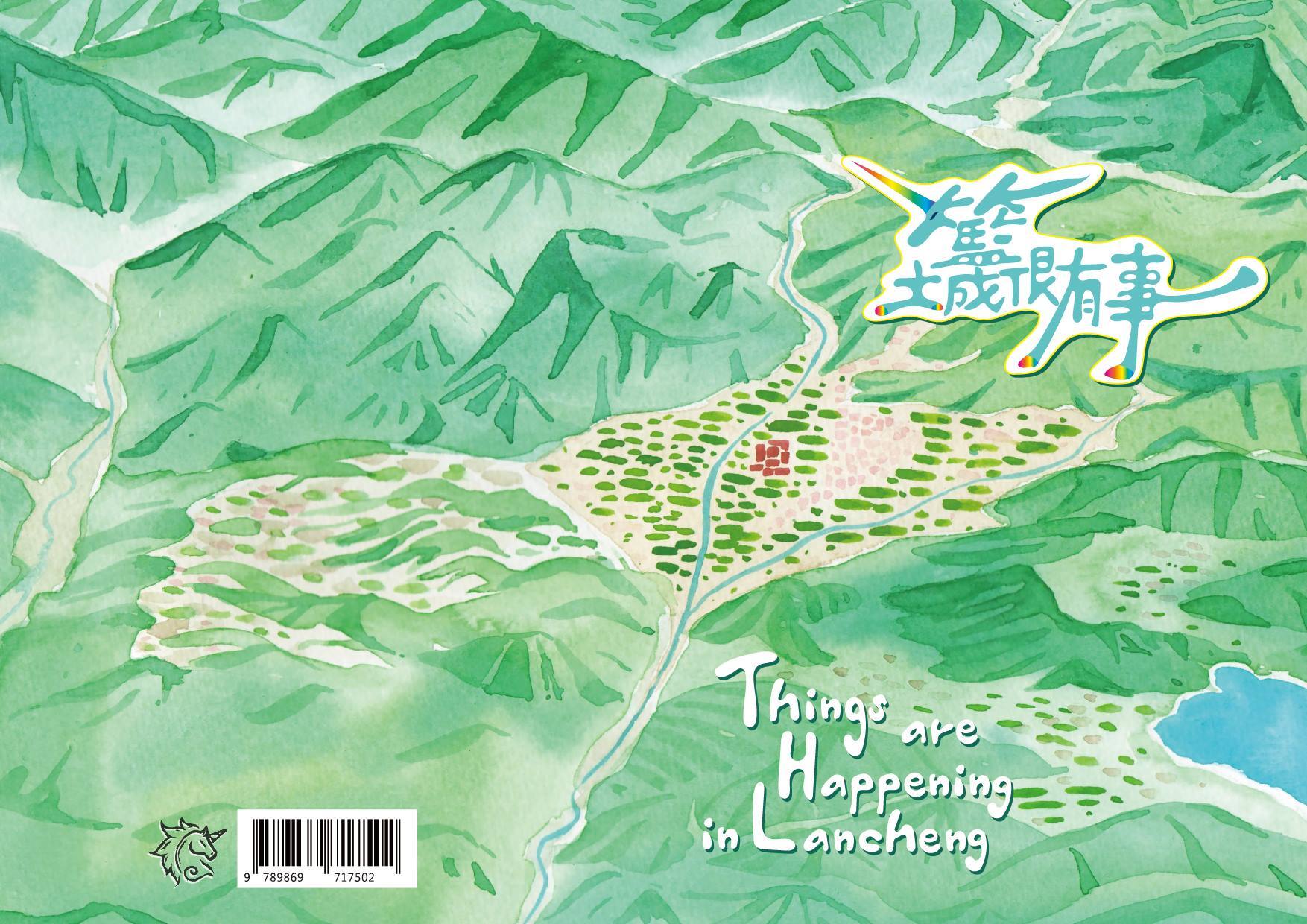A beacon of community empowerment— Professor Luo Li-bei

RESTbb (籃城書房), which stands for REST Book and Bed, is a literary-themed hostel café in Puli Township’s Lancheng community that is frequented by both local residents and backpackers alike. Visitors have to first travel through alleyways shrouded by fields of sugar cane and banana plants, stroll along several public murals depicting the bucolic countryside, and stride past a martial arts hall where farmers used to train for self-defense purposes. Fear not, the destination is up ahead — a stately grey house with distinct white window frames.
Upon opening the front door, visitors will be greeted by a vibrant atmosphere enhanced by a mix of elegant and industrial-style décor. The store’s red brick walls are lined with rows of books, and the bookstore’s resident unicorn awaits mid-prance upon a wall painting, ready to carry new riders to new literary heights.
Welcome to RESTbb, an oasis carefully tended by Luo Li-bei (羅麗蓓, Lyih-Peir Luo). The associate professor of foreign languages and literature can be found either serving delectable lemon tarts, apple pies, and beef Bourguignon, or with book in hand, reciting poetry and exchanging anecdotes about various literary figures.


corner, local students busy themselves with homework as their appreciative grandparents drop off bags of freshly harvest corn and leafy greens at the building’s doorsteps. As the closing hour approaches, readers also have the option to stay overnight in the store’s second-floor lodgings instead of navigating the darkness of countryside evenings.
A congregation of Taiwanese and world cultures, foreign languages, and literary motifs is the daily norm at RESTbb, but founding owner Luo doesn’t stop there. Her community outreach efforts extend beyond the physical reach of the bookstore. Just this summer, she joined the movement to help local sugar cane farmers with their cancelled orders, utilizing online marketing and effective branding to help sell derivative products such as cane sugar juice and molasses.
The sweet fragrance of cane sugar juice, which is one of the defining flavors of Puli Township and a childhood favorite in the collective memories of the Taiwanese, can thus be passed down to the next generation. And this is how a countryside bookstore became a nexus of community-led initiatives and a conveyor of outside information and new opportunities.
Exploring Puli
Professor Luo’s community-centric philosophy has long been in play in Puli before Taiwanese educational institutions began adopting the university social responsibility (USR) framework. From opening up her home to promote the habit of reading to supporting eco-friendly agricultural practices, organizing public forums, planning small-scale farm tourism, researching regional history, and publishing local tales, Luo has steadily fanned the community’s spirit with the latest knowledge and prospects.
In the wake of the devastation wrought by the September 21 Earthquake of 1999, National Chi Nan University deepened its efforts to collaborate with neighboring townships and settlements, culminating in collegial outreach programs and community empowerment courses that build upon decades of substantial exchanges and experiences. Moreover, this grassroots commitment has been recognized with the USR Best Practice Award at the Ministry of Education’s inaugural University Social Responsibility Expo in July 2018.
As for Luo, her first foray into the community began with an innocent question from her students — “What should we do after getting our degrees?” As a career academic whose focal point in life was teaching and research, and whose travels were for seminars and international conferences, she was stumped. Her life to that point was a narrow path from elementary to university, leaving one school with a doctoral degree only to join another as a faculty member. As a student, she was stellar, but what of her contributions as a member of society?
To chart unknown waters, the professor decided to take up additional roles from which to observe and give back to society. In searching for new values in life, Luo began to draft up a blueprint for opening a community bookstore. Books helped strengthen analytical thinking and independent learning for her two children, why not contribute to the dissemination of knowledge by establishing a public learning space for the betterment of culture and society?
Exploring Europe
Luo is an avid reader, in part due to the assigned readings that never fell below 50 books per semester during her time as a graduate and doctoral student in Germany. When she first enrolled in a German university, however, she still had trouble understanding the lectures and sought to discuss the issue with her professor. The response she received was: Those who cannot follow even after having read the assignments are unqualified to take my class.
The stern reprimand sent her scuttling back to the dormitory to weigh the options of giving up her studies and return to Taiwan, or doubling down and work harder. The committed student chose the latter, and began to expand her readings to include unassigned books on linguistics from the library while practicing her German skills by raising questions in class. She was rewarded with the position of research assistant, taught German-language courses on linguistics theory, and drafted book lists that even impressed the professor. Success was sealed with a doctoral degree and offers from publishers to release her thesis.
The studious backpacker also used long school breaks to visit various cities across Europe, taking in a diversity of cultural sights and scenes and basking in the freedom of traveling. This was how Luo broadened her world view and enriched her life outside of books during her student days, giving rise to her aptitude to navigate between cultures when foreign guests stay at RESTbb. She recalls one particular moment when a British visitor pointed to a tourist map and asked why the “4Ws” promotional campaign of Puli Township listed “women” among good weather, water, and wine. His real concern, she said, was the objectification of women.
Hosting overseas guests made her realize that Puli Township was sadly lacking in publications that introduced the region’s historic and cultural wealth. This epiphany ignited her desire to produce bilingual materials highlighting the Lancheng community with both Mandarin and English text, resulting in the release of “Things are Happening in Lancheng (籃城很有事)” and “Ship Mountain Cruise (船山巡航).”

The professor also shared a fond memory where an Australian traveler spoke about the delight of discovering her community publications, saying that it is rare to find foreign-language information for tourists in small towns, especially back in Australia.
The next step, Luo revealed, is to train local tour guides who are well-versed in the community’s inimitable qualities and capable of relaying such anecdotes to English-speaking visitors. The initiative may open up more opportunities for the youths who have chosen to stay in their hometown, and rein in substantial benefits for related industries, she added.
Apart from crafting an all-comprehensive “Greater Puli Studies” grassroots program, the professor is also preparing a school course that would introduce students to Puli’s Ailan Plateau from the perspective of Semiotics, the study of signs, as symbols help denote where the invisible divide lies between integrated and marginalized groups.
For example, students who once only looked out for McDonald’s or bento shops began to notice the unusual concentration of lotus motifs that dot the walls of Puli, and upon inquiry, uncovered how many elementary and middle school campuses were rebuilt with Buddhist aid in the destructive aftermath of the 7.3-magnitude earthquake in 1999.
Many of these students, who were but infants when the deadly tremor struck, had little to no recollection of the catastrophe, and went about their university life without noticing these indelible signs on the campus that sits near the epicenter of the 1999 quake, Luo explained.
Another previously unnoticed trend that they picked up on was the abundance of Vietnamese cuisine and flags that can be found in Puli Township. Using questions like “Have you ever had a conversation with migrant workers in Taiwan?” and “Many of our neighbors are new in town, have you welcomed them yet?” to address the topic, the professor has been able to bring greater awareness to the attitudes of superiority and discrimination that plague contemporary Taiwanese society.
Using her literary-themed hostel café as a base, Professor Luo’s enduring outreach efforts have strengthened Puli’s core identity, introduced new knowledge and initiatives, and fashioned a new charter for community-university cooperation. By linking Lancheng with National Chi Nan University and Puli Township, she has also brought the community closer to the world. (English text by Min Chao)
Those who are interested in learning more about the professor and her field can contact her at lpluo@ncnu.edu.tw.

